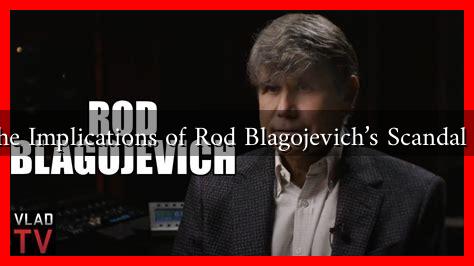-
Table of Contents
What Are the Implications of Rod Blagojevich’s Scandal on Politics?
Rod Blagojevich, the former Governor of Illinois, became a household name not just for his political career but for the scandal that ultimately led to his impeachment and conviction. His actions raised significant questions about ethics in politics, the influence of corruption, and the public’s trust in elected officials. This article explores the implications of Blagojevich’s scandal on politics, examining its effects on public perception, legislative reforms, and the broader political landscape.
The Scandal: A Brief Overview
In December 2008, Blagojevich was arrested on federal corruption charges, accused of attempting to sell the U.S. Senate seat vacated by Barack Obama after he was elected President. The FBI had been wiretapping Blagojevich’s conversations, revealing a pattern of corruption and abuse of power.
. In 2011, he was convicted on multiple counts and sentenced to 14 years in prison, although his sentence was later commuted by President Donald Trump in 2020.
Impact on Public Trust
One of the most immediate implications of Blagojevich’s scandal was the erosion of public trust in government. When elected officials engage in corrupt practices, it creates a perception that politics is inherently dishonest. This can lead to:
- Voter Apathy: Citizens may feel disillusioned and disengaged from the political process, believing their votes do not matter.
- Increased Cynicism: A general distrust of politicians can foster a culture of cynicism, where voters assume that all politicians are corrupt.
- Lower Turnout: As trust diminishes, voter turnout often declines, which can skew election results and diminish democratic representation.
According to a 2019 Gallup poll, only 17% of Americans expressed a great deal of trust in the federal government, a statistic that reflects the long-term consequences of scandals like Blagojevich’s.
Legislative Reforms and Responses
In the wake of the Blagojevich scandal, there was a push for legislative reforms aimed at increasing transparency and accountability in government. Some of the key reforms included:
- Stricter Campaign Finance Laws: Efforts were made to limit the influence of money in politics, with calls for more stringent regulations on campaign contributions.
- Enhanced Ethics Training: Many states implemented mandatory ethics training for public officials to ensure they understand the legal and ethical boundaries of their roles.
- Whistleblower Protections: Strengthening protections for whistleblowers encourages individuals to report corruption without fear of retaliation.
These reforms aim to restore public confidence and ensure that similar scandals do not occur in the future. However, the effectiveness of these measures remains a topic of debate among political analysts.
Broader Political Landscape
The Blagojevich scandal also had implications beyond Illinois, affecting the national political landscape. It served as a cautionary tale for politicians across the country, highlighting the risks associated with corruption. Some notable effects include:
- Increased Scrutiny: Politicians are now more closely monitored by the media and watchdog organizations, leading to a culture of accountability.
- Impact on Political Careers: The scandal has had a chilling effect on the careers of other politicians, who may fear being associated with corruption.
- Shift in Voter Priorities: Voters are increasingly prioritizing ethics and integrity when evaluating candidates, leading to a demand for more transparent governance.
For instance, the scandal influenced the 2010 gubernatorial election in Illinois, where candidates were scrutinized for their ethical records, ultimately leading to the election of Pat Quinn, who campaigned on a platform of reform.
Conclusion: Lessons Learned
Rod Blagojevich’s scandal serves as a stark reminder of the vulnerabilities within political systems and the potential for corruption. The implications of his actions extend far beyond his personal downfall, affecting public trust, prompting legislative reforms, and reshaping the political landscape. As citizens and lawmakers continue to grapple with the consequences of such scandals, it is crucial to prioritize transparency, accountability, and ethical governance to restore faith in the political process.
In summary, the Blagojevich scandal underscores the importance of vigilance in politics and the need for ongoing reforms to protect democracy. As we move forward, the lessons learned from this scandal can help guide efforts to create a more trustworthy and effective political system.
For further reading on political ethics and reform, you can visit Brookings Institution.





